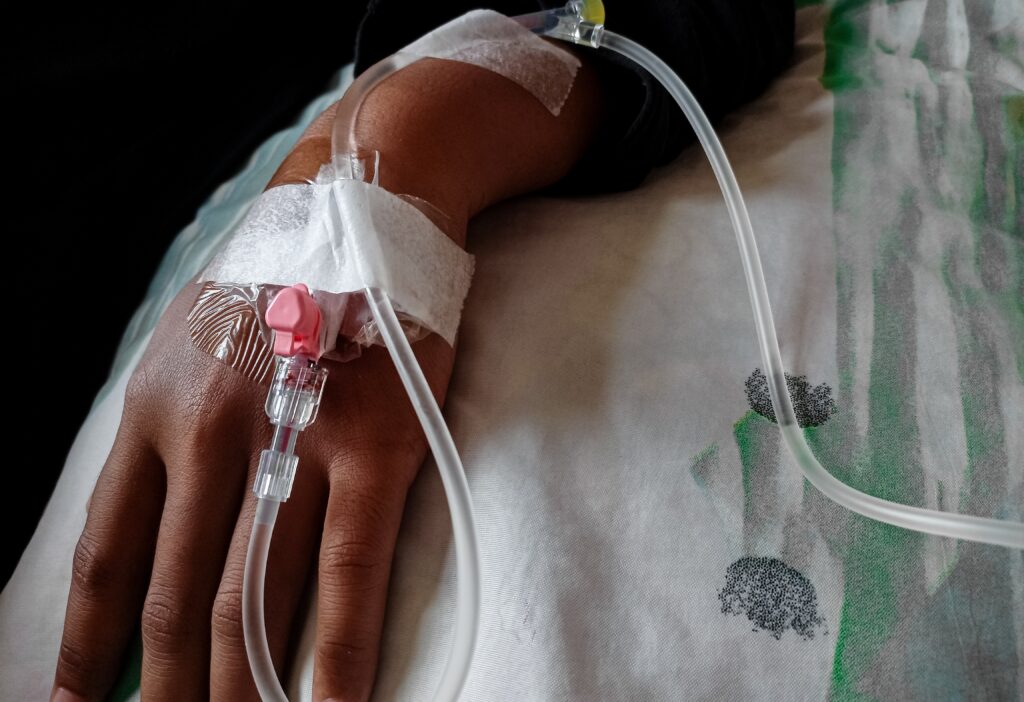When I was hospitalized for PPROM, I thought the hardest part was already behind me. I was trying to adjust to the slow, uncertain rhythm of hospital days when, a few days later, I noticed something different, a faint pink tinge whenever I went to the bathroom.
At first, I tried to stay calm. I told myself it might just be irritation from bed rest or monitoring. But over the next few days, the bleeding got worse. What started as spotting soon became heavier, and I began soaking a pad in less than an hour.
Even though the pain was mild, more like a dull period cramp, I knew something wasn’t right. I told my nurse, and soon my room filled with quiet urgency.
🩸When Things Escalated
The doctors acted quickly. They started me on magnesium to protect my baby’s brain and steroids to help develop his lungs in case he came early. I didn’t like how the magnesium made me feel. I was hot, flushed, and nauseous. My body felt heavy, and every time I tried to stay awake, I drifted into deep sleep.
For a short while, the bleeding stopped, and I let myself breathe again. But just as I started to feel hopeful, it came back, stronger than before. The nurses kept changing my sheets, and I could tell from their faces that this wasn’t normal.

Facing the Unknown
By the fourth day, I was still bleeding heavily, and there was no sign of improvement. The team performed an ultrasound to see if the baby was head down, just in case delivery became necessary.
I was 29 weeks. My heart dropped when they said I was already 1 cm dilated. If the baby wasn’t head down, it would mean an emergency C-section. Thankfully, his little head was in position, ready, but much too soon.
After Delivery
When I finally delivered, the doctors discovered that I had indeed suffered a placental abruption. The placenta had partially separated from my uterus. That moment confirmed everything my instincts had been telling me.
Looking back, I realize how easily the symptoms could have been brushed off as “normal bleeding.” But they weren’t. If you ever notice new or worsening bleeding after PPROM, don’t wait. Speak up. You know your body better than anyone.
💗 What I Learned
- Trust what your body is telling you.
Even when the pain is mild, you can still feel when something’s off. Always speak up — even if you worry you’re overreacting. - Not every emergency looks dramatic.
My abruption didn’t come with sharp pain or chaos. It crept in quietly, and even the doctors didn’t realize what was happening until later. - Magnesium and steroid shots are rough — but lifesaving.
They made me miserable, but they gave my baby a fighting chance. - You can feel terrified and grateful at the same time.
Those hospital days were heavy, but every heartbeat and ultrasound gave me hope.
To Every Mama Going Through This
Placental abruption doesn’t always announce itself loudly.
Sometimes it whispers through slow bleeding, quiet pain, and instincts you can’t explain.
If you’re in the hospital right now, waiting, hoping, or scared. Here is what you should know. This part of the journey is incredibly hard, but it’s also where your strength shines the most. Every day you hold on, every extra hour your baby gets, matters.
You are doing better than you think, and you are not alone.
My story didn’t end there. After my baby’s birth, the NICU became our second home, a world that changed how I saw everything. You can read about that next in When the NICU Becomes Home.
Follow me on TikTok and Instagram for real NICU moments, tips, and encouragement.

some really wondrous work on behalf of the owner of this site, utterly outstanding subject matter.
Have you ever thought about writing an ebook or guest authoring on other websites? I have a blog based upon on the same subjects you discuss and would love to have you share some stories/information. I know my readers would appreciate your work. If you are even remotely interested, feel free to shoot me an e mail.
Perfect just what I was searching for! .